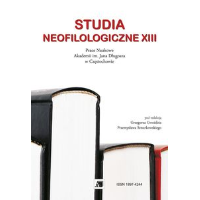Europejski System Opisu Kształcenia Językowego (Esokj) w Kształceniu Filologicznym – Diagnoza i Perspektywy
Common European Framework of Reference for Languages (CEFR) on the university level – diagnosis and perspectives
Author(s): Marcelina Kałasznik, Joanna SzczękSubject(s): Language studies, Foreign languages learning, Higher Education , Philology
Published by: Uniwersytet Jana Długosza w Częstochowie
Keywords: CEFR; German philology; leveling tests; achievements of students of German philology;
Summary/Abstract: This study aims to present the possibility of applying the provisions of the Common European Framework of Reference for Languages (CEFR) on the university level. Academic training is seen here as the last stage of learning, which should create a coherent whole with language education on other levels. Assumptions of language education on all language stages allow to assume that candidates wishing to study philology have appropriate language skills. In our article we try to show level of candidates to study philology from two perspectives – namely from the perspective of their own estimates and on the basis of tests that verify the level of knowledge of the German language carried out in the first week of studying on the field of study German philology. In order to be able to make such a verification, a survey has been conducted among the students of German philology at the University of Wroclaw on widely understood knowledge of foreign languages – divided into first and second. The results of this survey have been presented and discussed in the article, and later confronted with the results of the leveling tests and other facts arising from the real achievements of students.
Journal: Prace Naukowe Akademii im. Jana Długosza w Częstochowie. Studia Neofilologiczne
- Issue Year: XIII/2017
- Issue No: 13
- Page Range: 105-118
- Page Count: 14
- Language: Polish

